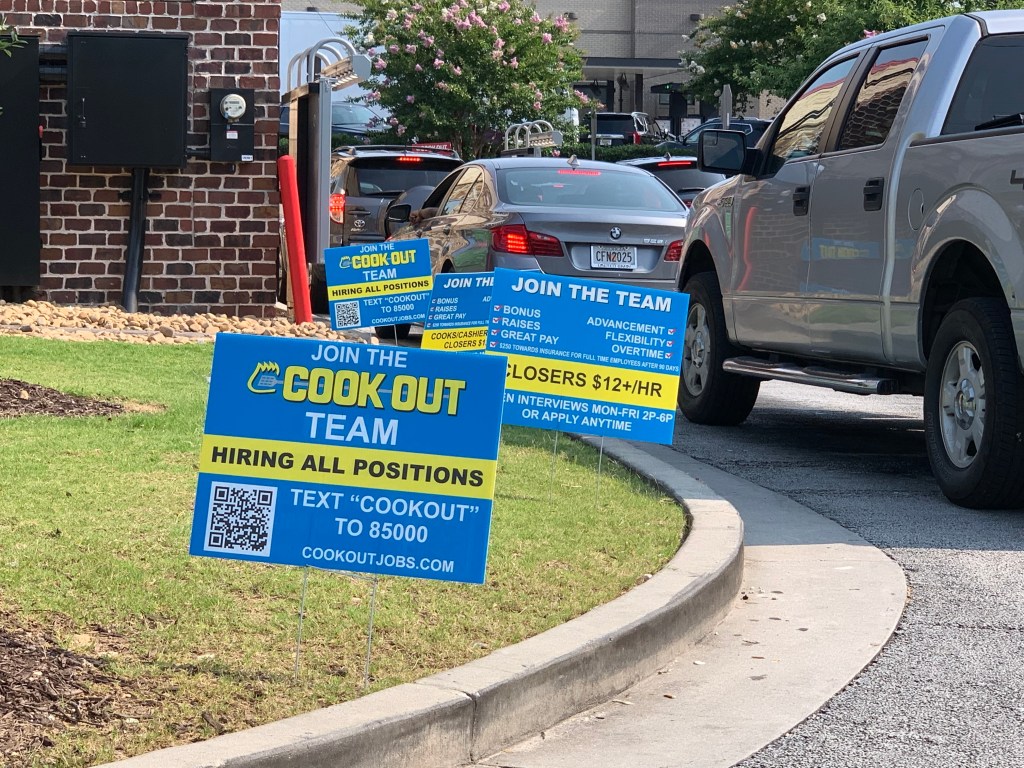
If you’ve been to a restaurant or fast food joint lately, you’ve likely noticed “We’re Hiring” signs. That’s because local eateries are struggling to find employees to fill positions after the pandemic shutdown.
Fast food restaurants like Cook Out are offering $12 an hour, bonuses, raises, and contributing to health insurance to attract employees. On a recent Saturday afternoon, the Krystal on Northside Drive at 14th in West Midtown had to temporarily shut down its busy drive-thru window as it waited for employees to arrive. But it’s not just the fast food industry that’s facing staffing issues.
State-wide shortage
Karen Bremer, president and CEO of the Georgia Restaurant Association, said she believes restaurants across the state are still short 50,000 to 70,000 workers.
“Restaurateurs are struggling to find workers. Many have reduced hours and days open due to worker shortages,” Bremer said in a statement. “Some are offering signing bonuses, guaranteed schedules, and higher hourly wages.”
She said the worker shortage would continue due to robust consumer demand. No doubt more people are eating out compared to last summer.
‘Complicated issue’
Robby Kukler, a partner with Atlanta-based Fifth Group Restaurants, said the labor shortage is preventing his company from reopening one of its restaurants. Fifth Group operates ten restaurants including South City Kitchen, Alma Cocina, Lure and Ecco, with locations in areas such as Buckhead, Virginia-Highland and Midtown.
Alma Cocina in downtown Atlanta has been closed since March 2020. Fifth Group hoped to reopen in July, but the company has been unable to hire the management team needed to open the doors.
Its other restaurants have staggered open hours, with only two restaurants open seven days a week. “We are trying to be strategic about when will we do business,” Kukler said. “But it also comes down to when your staff can work.”

He added the company still needs to hire in excess of 100 people. In fact, its peak employment before the pandemic (including its catering company Bold Catering & Design) was around 950 workers. Today, it has about 450.
“It’s a very complicated issue,” Kukler said of the labor issue, and it’s not unique to the restaurant business.
Due to the pandemic, he said, “there are a lot of people around the world who are thinking about life. I think people took opportunities to change careers or try something on their own, or just can take a little more time off this summer.”
To help attract workers, Fifth Group has a “generous and aggressive referral program” where it offers current employees $500 if they refer a new hourly employee. The company also offers signing bonuses for new hourly workers, giving them an additional $1,000 after they work 100 days. Plus, hourly wages for back-of-house staff, such as line cooks and dishwashers, now range from $15 to $22 per hour.
“It really isn’t attracting a lot of people,” Kukler said. “Where is everybody?”
He’s unsure when the industry will recover, as he wonders how cooler weather this fall and the spread of the COVID-19 Delta variant could affect the state, which has low vaccination rates.

His message to the public? “Get vaccinated.”
Mitchell Anderson, who owns MetroFresh in Midtown, said he’s also been having trouble finding workers, including a cook.
“I have posted on several platforms, I’ll get limited interest with even fewer qualified people,” Anderson said. “I’ll make appointments for people to come in for an interview and 90 percent of the time they don’t even show up. It’s super frustrating and ultimately may lead to shorter hours for the restaurant if I can’t fill the position soon.”
Rethinking operations
Dunwoody resident and hospitality veteran David Abes said he’s never seen a worker shortage like this in his 30-year career.
“That’s the number one topic for my clients – staffing,” said Abes, owner of Dash Hospitality, a restaurant consulting business. Abes is also behind a planned restaurant and entertainment district in the Dunwoody Village that’s expected to start construction in August.

“I think it has to do with attitude and the perception of restaurant business,” he said, explaining that with the pandemic, many people started to examine their quality of life and the hours they spend working. He’s finding workers are “hesitant to go back into the hospitality business.”
In response, restaurant owners are having to rethink their operations. Some are using technology to counter labor shortages, such as investing in pay-at-the-table devices and new equipment to help automate back-of-house operations, Abes said.
“The good operators have pivoted,” he said, adding he’s optimistic that early next year more people will return to work.
Future outlook
A recent survey conducted by job search website Indeed doesn’t offer any immediate relief but is hopeful for the fall. The survey indicated that workers don’t feel a sense of urgency to get back to work this summer.
However, many unemployed workers said increased vaccination against COVID-19, shrinking savings, and the opening of schools in the fall will be key catalysts for stepping up their job searches, the survey said.
Also, Georgia recently withdrew from pandemic programs that allowed unemployed residents to get extra financial support from the federal government. That could motivate people to return to work.
